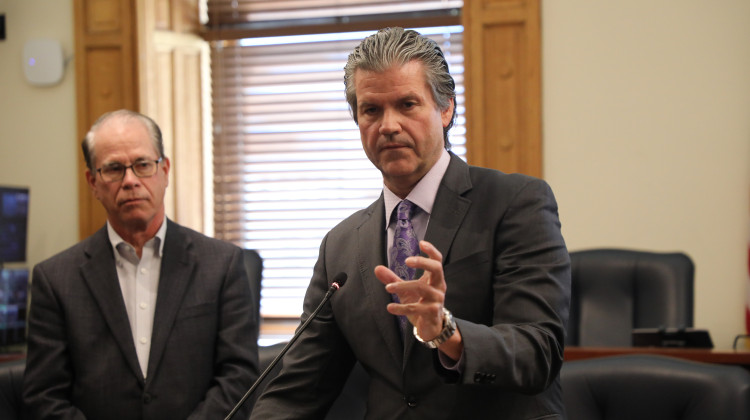
State Sen. Ryan Mishler discussing changes to Indiana’s budget at a press conference on Wednesday, April 23, 2025 in Indianapolis.
Ben Thorp / WFYILanguage included in bills passed at the end of Indiana’s legislative session included limits on the populations local health departments could serve using state funding.
Indiana’s budget bill included one line that set off alarms for local health departments and health advocates, requiring that state health funding only be used on legal citizens of the United States. But lawmakers said a local government finance bill passed right before the budget bill included language intended to soften that impact, changing it to those who are “lawfully present” in the U.S. They said that language ultimately supersedes what is included in the budget bill.
“The way I read it, we’re saying that if you’re known to be an illegal, you’re not eligible for the benefit,” said State Rep. Ed Delaney (D-Indianapolis). “I wish we weren’t even going that far. I don’t think public health officials should be concerned with immigration issues. I don’t really care whether I get my communicable disease from a citizen or someone who is here illegally.”
At issue is funding for Indiana health departments through the state’s Health First initiative. Local counties had to opt into the program, and in 2024, all of them did.
The funding bolstered support for things like immunizations, chronic disease prevention, and maternal and child health. While local health departments rely on a mix of local, state and federal funds, the state funding makes up a significant portion of their budgets, especially in smaller counties.
The Indiana General Assembly appropriated $225 million for public health funding, with $75 million for 2024 and $150 million for 2025.
The latest approved budget slashes the number down to $40 million per year.
There were warning signs that lawmakers were looking towards restrictions on the program earlier this year. Following a budget presentation from State Health Commissioner Lindsay Weaver in front of the Senate Appropriations Committee on March 13, Weaver was told lawmakers were receiving complaints about local programming.
State Sen. Ryan Mishler (R-Mishawaka) said some constituents were concerned about how state money was being used.
“They have concerns about the program and want to see us cut it or eliminate it,” he said. “I don’t want to sit here and say we’re going to eliminate it, we’re going to cut it, but you may see some restrictions on the uses.”
Speaking to the Indiana Capital Chronicle, Mishler said the constituents’ concerns were related to health care services being provided to undocumented immigrants.
Mishler did not respond to WFYI’s multiple requests for comment.
The “citizen” language worried public health officials, who said it could have wide-ranging consequences for community health.
Stacie Rees, the administrator of the Tippecanoe County Health Department, said the original language about citizens could limit the department’s ability to provide services such as vaccinations and maternal and child health care.
That was especially concerning to her because of the international students attending Purdue University.
“It would impact us drastically, being a diverse population,” she said. “Communicable diseases don’t discriminate. Education shouldn’t discriminate.”
But there are still questions about how health departments will determine who is “lawfully present.”
Other health experts have raised the concern that checking a patient's immigration status could dissuade undocumented people from reporting illnesses or seeking help.
Rep. Delaney said there are no penalties in the bill and no clear enforcement mechanism. He’s hopeful the “lawfully present” language won’t amount to much.
“It’s not self-enforcing, it doesn’t require enforcement, we should just let it sit there,” he said.
Under the law creating Indiana’s Health First funding for local health departments, 60% of the funds are intended to go towards what are defined as “core public health services.” That includes communicable disease prevention and control, tobacco prevention and cessation, maternal and child health, access to adult and child immunizations, testing and counseling for HIV and other sexually transmitted infections, as well as screening and case management for childhood lead exposure and poisoning.
All of these and more could be impacted by the new language passed during this session, said Marc McAleavey, CEO of the Indiana Public Health Association.
Even though lawmakers made the language less restrictive, McAleavey said the devil will be in the details of enforcement. He said it’s not clear to him how health departments will check a person’s legal status before rendering health services.
“These systems will have to be built, and it will cost money, and it creates another layer of bureaucracy,” he said. “When it comes down to implementation and you think about the process, you would have to train staff, create a protocol, and adhere to that protocol for every person you see. That’s a big lift.”
And McAleavey said excluding people from services cuts against the logic of public health. He said communicable diseases do not understand immigration status.
“Tuberculosis doesn’t say, ‘Oops, you don’t have citizenship status so I’m not going to infect you,’” McAleavey said.
Contact Health Reporter Benjamin Thorp at bthorp@wfyi.org.
 DONATE
DONATE






 Support WFYI. We can't do it without you.
Support WFYI. We can't do it without you.